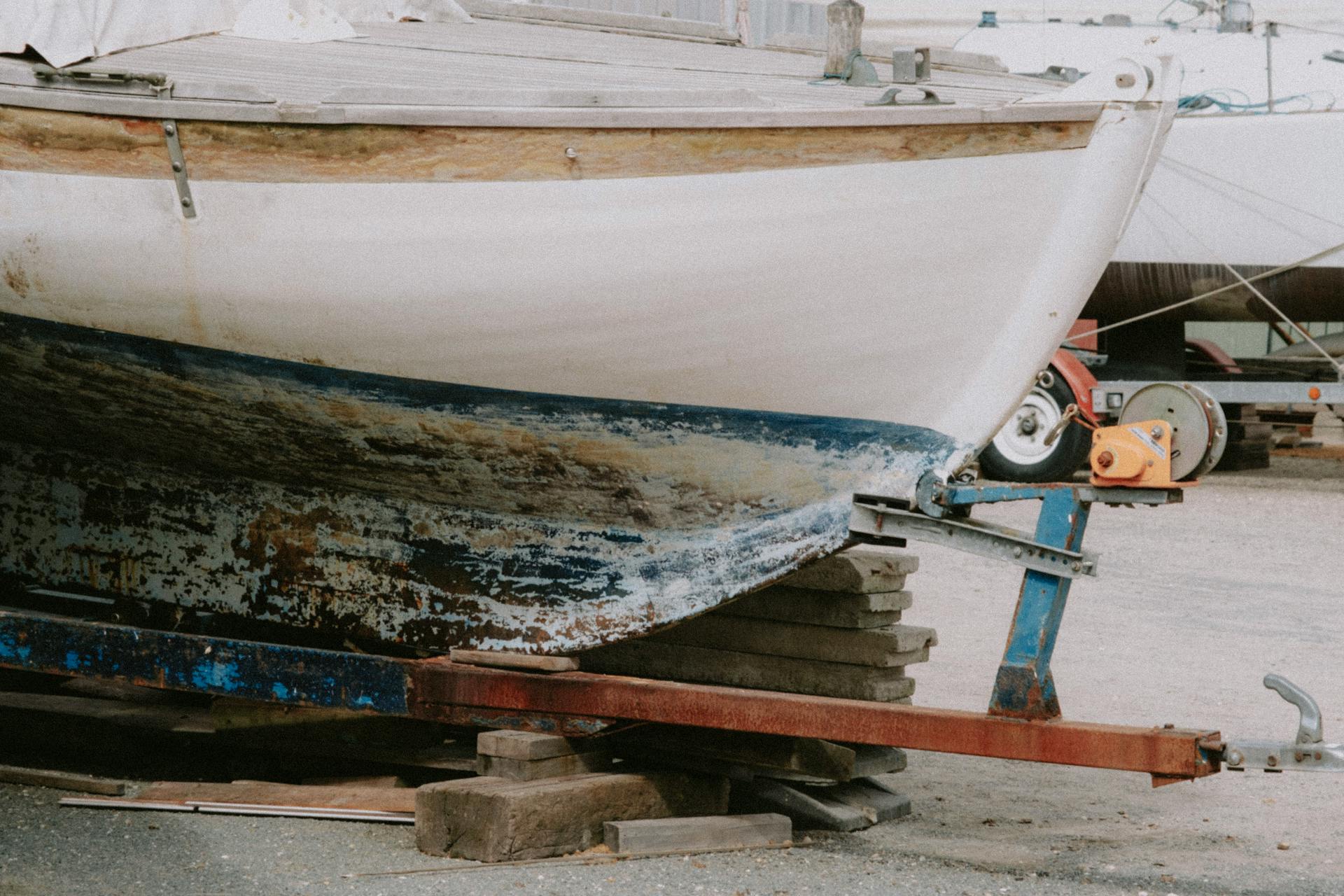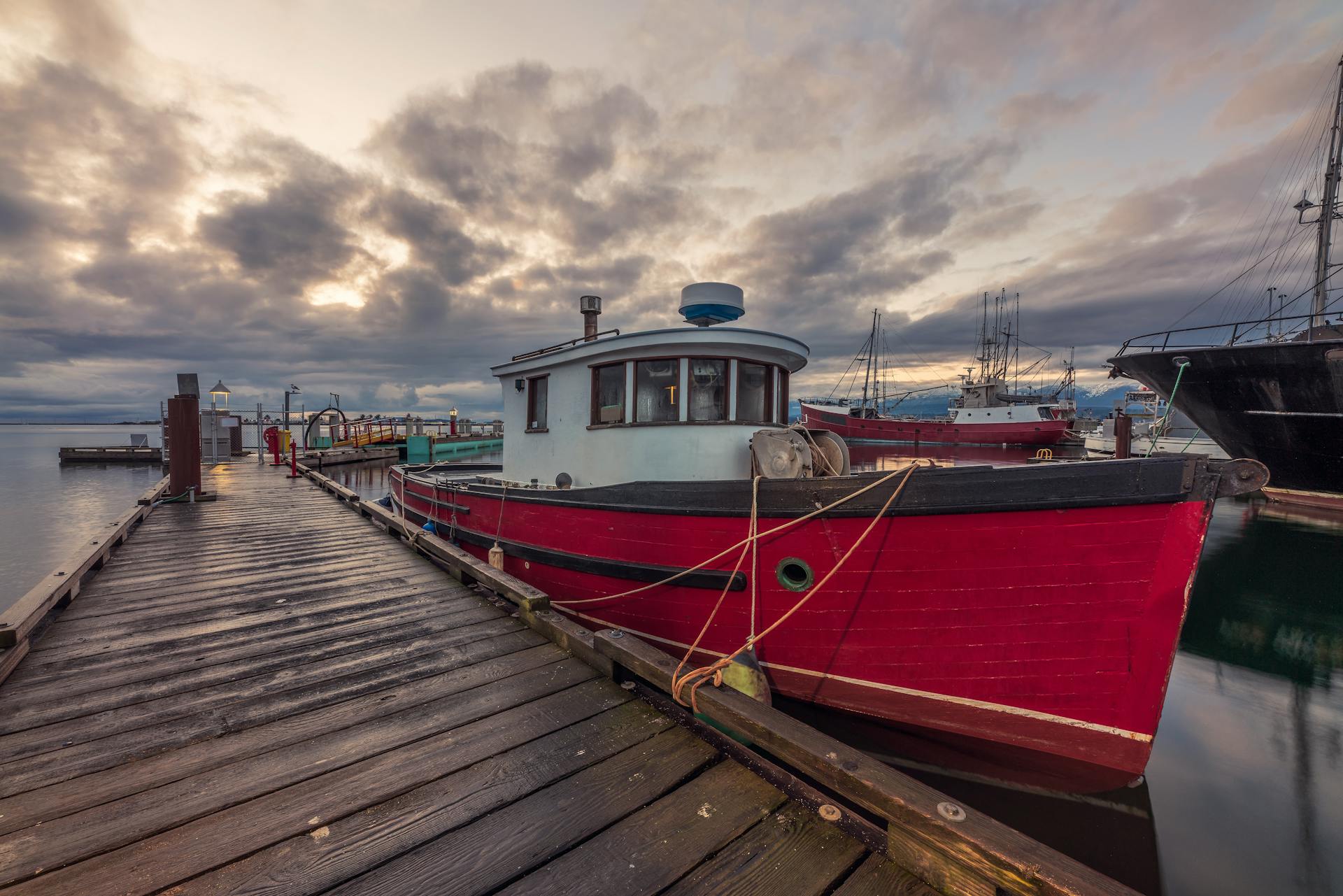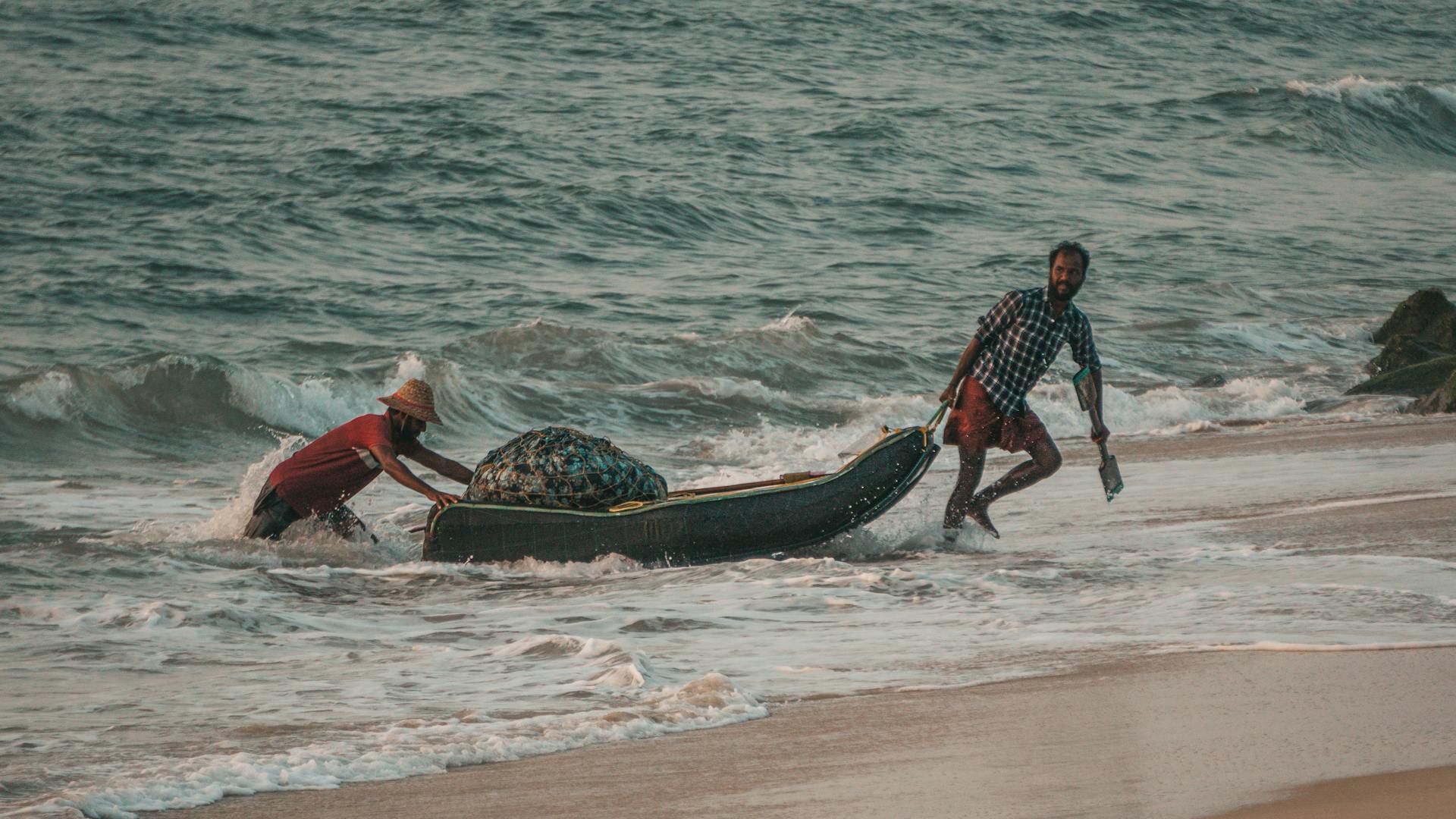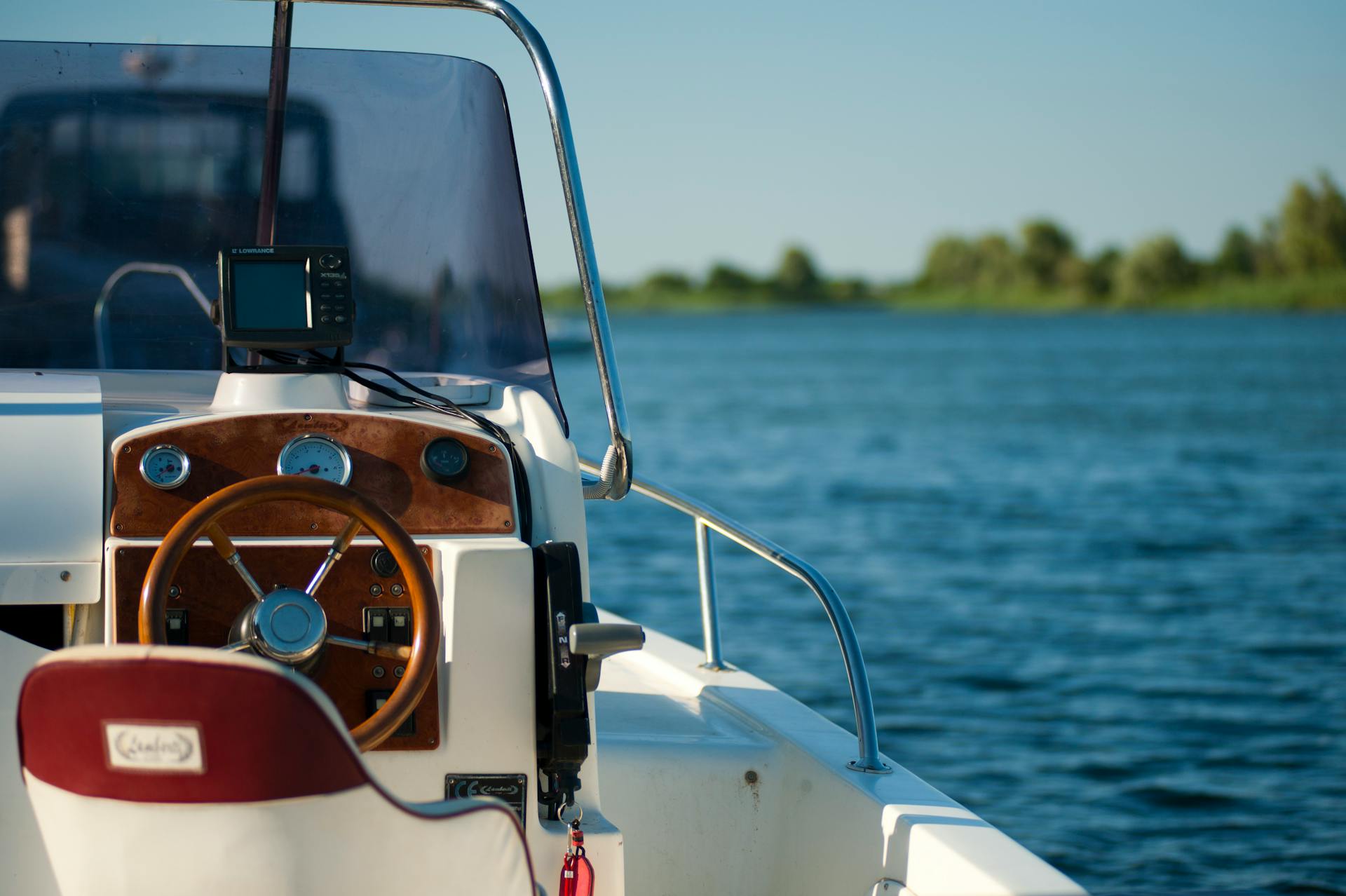
Most homeowners insurance policies don't automatically cover boats and watercraft, but some do. It's essential to check your policy before purchasing a boat.
A few insurance companies offer optional coverage for boats, which can be added to a standard homeowners policy. This type of coverage is usually called "personal watercraft coverage."
Broaden your view: Marine Liability Coverage
What Is Boat Insurance?
Boat insurance is a specialized type of insurance that protects your watercraft and its contents from damage or loss.
It's a separate policy from your homeowners insurance, which may not cover your boat, even if it's stored in your garage or on your property.
Boat insurance typically covers damage to the vessel itself, as well as liability for accidents that involve other people or property.
It can also provide coverage for your personal belongings on board, such as electronics or fishing gear.
The cost of boat insurance varies depending on factors like the type and value of your boat, your location, and your boating experience.
In general, boat insurance is a worthwhile investment, especially if you plan to use your boat frequently or store it in a high-risk area.
Expand your knowledge: Does Homeowners Insurance Cover Rental Property
Coverage Options

Comprehensive coverage is a must-have for boat owners, as it protects against damage from events beyond your control, such as theft, vandalism, and weather-related damage.
Heavy winds can cause significant damage to your boat, but with comprehensive coverage, you'll be protected and can file a claim to cover the costs, minus your deductible.
Collision coverage, on the other hand, covers damage from boating accidents, including hitting a submerged object or another boat.
If you hit a submerged object and damage your boat, collision coverage will pay for the repairs, minus your deductible.
Comprehensive Collision
Comprehensive collision coverage is a must-have for any boat owner, and it's essential to understand what it entails. Comprehensive coverage pays for events out of your control, such as theft, vandalism, sunken boat, fires, heavy winds, hurricanes, and other weather-related damage.
Heavy winds can rip the sails off your boat, causing thousands in damage, and if you have comprehensive coverage, you'll be protected. This coverage also includes damage from fires, which can be devastating to your boat.

Collision coverage, on the other hand, covers damage from boating accidents, such as hitting a submerged object, dock, another boat, and even covers any injuries to pets on your boat. If you hit a submerged object and damage your boat and your dog is hurt in the accident, collision coverage will pay for damage to your boat, minus your deductible, and injuries to your dog (up to $1,000).
It's worth noting that comprehensive and collision are two separate coverages, so it's essential to understand what each one covers. By having both coverages, you'll be well-protected against a wide range of risks.
Intriguing read: Does Homeowners Insurance Cover Dog Bites off Property
Medical Payments Coverage
Medical Payments coverage is a must-have for any boat owner. It pays for first aid treatment, ambulance, hospital, and other costs resulting from someone being injured on your boat, even if you're not legally responsible.
You should verify that your policy has an adequate limit of coverage for Medical Payments. This coverage is crucial to ensure you're not left with a hefty medical bill.
Related reading: What Does Boat Insurance Not Cover

Make sure to check if the coverage applies while someone is boarding or leaving your boat, and while being towed behind it, such as while water skiing. It's also essential to confirm that injuries to you and your family are included in this coverage.
Coverage on a "per person" basis may be preferable to coverage on a "per accident" basis, especially if you have a large family or frequently have guests on board.
Optional Add-Ons
If you have a boat, you can add additional coverage to your homeowners insurance policy, but it's essential to understand the specifics.
Most homeowners insurance policies cover boats up to a certain value, typically $10,000 to $20,000.
You can add an optional endorsement to increase the coverage limit, but this may require a separate policy or riders.
Some insurance companies offer separate boat insurance policies, which can provide more comprehensive coverage for your vessel.
Be sure to review your policy documents and ask your insurance provider about the specific coverage and limits for your boat.
Liability and Risk

Liability insurance is the minimum standard most states, banks, and marinas require for boat owners. This type of coverage protects you in case of bodily injury or property damage while operating your watercraft.
Bodily injury liability covers you if you're in a boat accident and liable for injuring others, paying to repair or replace any damaged property and covering legal expenses if you're sued.
The recommended amount of liability coverage can be even higher if you have a fast, powerful boat that is both riskier and can cause more damage. Some boat insurance professionals recommend buying at least $100,000 in liability insurance.
Recommended read: Does My Homeowners Insurance Cover My Injury
BI/PD Liability
Bodily injury and property damage liability, or BI/PD, is a crucial aspect of boat insurance. It covers you in case of accidents that result in bodily injury or property damage to others.
This type of coverage is often required by states, banks, and marinas, as it protects you from financial liability in the event of an accident. In fact, most states require at least $100,000 in liability insurance.
Recommended read: Does Homeowners Insurance Cover Workers on Your Property

BI/PD liability can pay for the costs of repairing or replacing damaged property, as well as medical expenses for injured parties. For example, if you crash your boat into a pier and cause thousands of dollars in damage, liability insurance will cover the costs.
The recommended amount of liability coverage can vary, but buying at least $100,000 is a good starting point, especially if you have a fast or powerful boat that can cause more damage.
If you're sued for damages or injuries, liability insurance can also cover your legal expenses. It's essential to have adequate coverage to avoid financial ruin in the event of an accident.
Fuel Spill
A fuel spill can be a nightmare, especially if it's caused by a sunken boat or a leaky tank. If you're a Progressive policyholder, you're in luck - they'll pay for fuel spills, regardless of how they happened.
Their coverage includes cleaning up the fuel and mitigating damages, up to your policy's limits. This means you won't have to worry about the financial burden of a fuel spill, even if it was an accident.
Progressive's policy is clear: they'll pay for fuel spills, whether it's a boat sinking in open water, a leaky tank, or a mishap at the fueling station.
Broaden your view: What Does Progressive Homeowners Insurance Cover
Hurricane Haul Out

If a hurricane is forecasted in the county where your boat is located, you may be able to get reimbursed for the cost of hauling it out.
The National Weather Service issues tropical storm or hurricane watches or warnings, which trigger this coverage. If a warning is issued, you can expect to get 50% of the cost reimbursed, up to $2,000.
The cost for hauling out can be steep, but this coverage can help offset it. For example, if the marina charges $2,000 to haul out and relaunch your boat, you can get $1,000 reimbursed.
Discover more: Does Boat Insurance Cover Hurricane Damage
Why You Need It
Boat insurance is not required in all states, but if you finance your boat or dock it at a marina, you may need a specialty boat policy.
Homeowners insurance typically covers small, low-powered watercraft, but it offers limited optional coverages.
If you have a boat, you may be able to insure it on your homeowners insurance policy, but this is often not the best option.
Homeowners policies usually don't provide the comprehensive coverage you need for a boat, so it's better to consider a specialized policy.
Boat insurance can help protect you financially in case of an accident or damage to your boat, which is why many boaters choose to get a separate policy.
Consider reading: What Does Homeowners Insurance Cover and Not Cover
Frequently Asked Questions
What is a watercraft endorsement to a homeowners policy?
A watercraft endorsement is an optional coverage added to a homeowner's policy that protects boats owned or used by the policyholder. This endorsement requires a separate premium payment to be included in the policy.
Sources
- https://orchidinsurance.com/blog/boat-insurance/
- https://www.dicklawfirm.com/blog/2022/june/does-homeowners-insurance-cover-boats-and-waterc/
- https://www.progressive.com/boat/coverages/
- https://www.chubb.com/us-en/individuals-families/resources/understanding-boat-insurance.html
- https://www.boat-ed.com/blog/do-i-need-boat-insurance-answers-to-the-top-9-questions/
Featured Images: pexels.com


